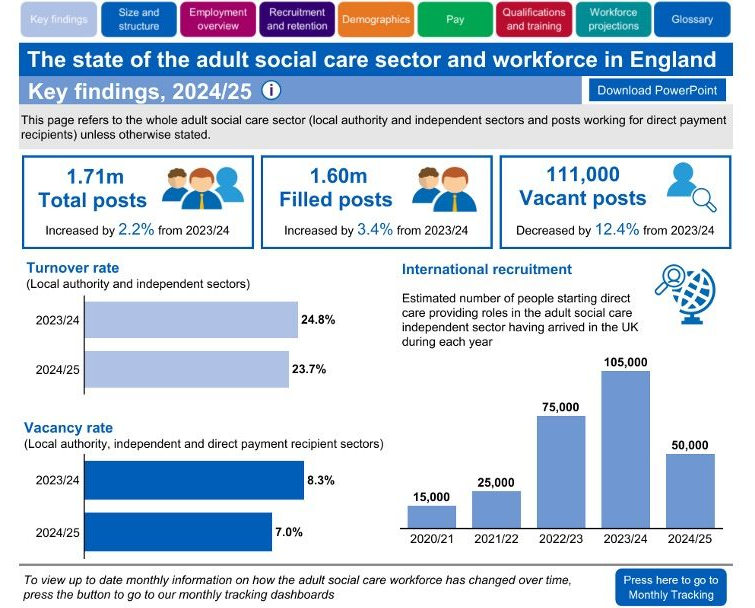Growing adult social care sector contributing £77.8 billion to England’s economy – but domestic recruitment and retention challenges persist

The adult social care sector in England continued to grow in 2024/25, contributing £77.8 billion to the economy. However, new data from Skills for Care highlights ongoing challenges in domestic recruitment and workforce sustainability
The annual ‘State of the adult social care sector and workforce in England’ report shows that the total number of posts in adult social care increased by 2.2% on the previous year. As well as providing a vital public service, the sector’s economic contribution increased by 12.2% to reach £77.8 billion
This increase in economic contribution is largely driven by more filled posts in social care and an increase in the National Living Wage, resulting in an increase in average pay. This shows that improved workforce capacity and pay in social care brings economic benefits for wider society
Vacancy rates have also returned to pre-Covid levels at 7% (as reported in our ‘Size and structure of the adult social care sector and workforce report’) and the proportion of men in the workforce reached a new record for the third successive year – now at 22%
While improvements in workforce capacity continue to be supported by international recruitment, the number of new international recruits fell from 105,000 in 2023/24 to 50,000 in 2024/25. Over the same period, the number of workers with British nationality declined by 30,000 (a 2.6% decrease)
With the vacancy rate still around three times that of the wider economy, the report’s findings demonstrate how, rather than overseas recruits taking jobs from British people, international recruitment has continued to benefit employers struggling to recruit domestically. The lack of growth in domestic recruitment highlights the need to build a more sustainable, long-term workforce
For the first time, the report includes figures on employer sick pay and pension contributions which show that 62% of care providing establishments using the Adult Social Care Workforce Data Set (ASC-WDS) don't offer enhanced sick pay and 57% don't offer enhanced employer pension contributions (more than 3%)
The proportion of care and support workers with a Level 2 qualification has fallen to 38% - down from 41% in 2023/24 and 48% 2018/19
As part of the report, Skills for Care analyses 'Five factors affecting turnover’. These are
- pay up to 30% below the local authority average
- not being on a zero-hours contract
- receiving training
- having a qualification relevant to social care
- working full-time
The latest findings show a contrast in turnover rates: people with none of these factors in place are almost three times more likely to leave their jobs compared to people with all five factors (42.2% vs 14.4%)
.Other key findings from the report include
- The vacancy rate for 2024/25 fell to 7%. This was a return to similar levels seen prior to 2021/22, when the rate had peaked at 10.5%
- The total number of vacant posts in 2024/25 was 111,000, which is a 12.4% decrease on the previous year
- The number of filled posts grew by 3.4% to 1.6 million. This growth was smaller than the previous year, but still the second highest increase on record
- The turnover rate in the independent sector decreased from 25.8% in 2023/24, to 24.7% in 2024/25
- The total number of posts in adult social care in England – comprising filled and vacant posts - was 1.71m in 2024/25
- The sector still faces long-term recruitment and retention challenges as it is projected to need around 470,000 new posts - an increase of 27% - by 2040 to keep up with the projected growth in the population over the age of 65
Professor Oonagh Smyth, Skills for Care’s CEO, says:
“Our latest report highlights the complex nature of the social care sector today, with encouraging signs of progress for our workforce, alongside challenges that still need to be addressed
“It’s positive to see our workforce growing, and vacancy and turnover rates continuing to fall. However, much of this improvement is being driven by international recruitment and, as both domestic and international recruitment are slowing, we need to explore new pathways to build sustainable workforce capacity
“At the same time, falling qualification levels – when care roles are becoming more complex – suggest that capability, as well as capacity, is likely to be a challenge in the future. We have to ensure that people have the skills, values and confidence to do these essential roles in social care
“To meet growing and changing care needs, we must prioritise domestic recruitment and invest in learning and development for our workforce
“That’s why initiatives such as the Workforce Strategy that we published last year, and steps towards a Fair Pay Agreement and a National Care Service are so important. They are vital to building a thriving, skilled workforce that plays a central role in neighbourhood health – and ultimately supports people to live a good, independent life in a place they can call home."
“Skills for Care will continue to work with partners across the sector to support workforce development in practice and ensure the insights from this report inform future planning and policy.”
The ‘State of the adult social care sector and workforce report’ uses data shared through Skills for Care’s Adult Social Care Workforce Data Set (ASC-WDS), which has information on more than 700,000 staff in over 21,000 locations
ASC-WDS also offers benefits for care providers including the ability to analyse and benchmark their data, a place to store training and qualifications records – and access to funding through the Learning and Development Support Scheme
Find out more about ASC-WDS and sign-up




















